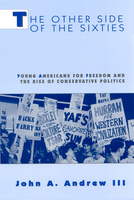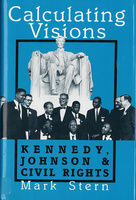Showing 1-4 of 4 items.
The Other Side of the Sixties
Young Americans for Freedom and the Rise of Conservative Politics
Rutgers University Press
The Other Side of the Sixties offers a gripping account of Young Americans for Freedom (YAF), an organization that became a leading force in promoting conservative ideas and that helped lay the groundwork for today's conservatism.
The New Winter Soldiers
GI and Veteran Dissent During the Vietnam Era
Rutgers University Press
Richard Moser uses interviews and personal stories of Vietnam veterans to offer a fundamentally new interpretation of the Vietnam War and the antiwar movement. Although the Vietnam War was the most important conflict of recent American history, its decisive battle was not fought in the jungles of Vietnam, or even in the streets of the United States, but rather in the hearts and minds of American soldiers. To a degree unprecedented in American history, soldiers and veterans acted to oppose the very war they waged. Tens of thousands of soldiers and veterans engaged in desperate conflicts with their superiors and opposed the war through peaceful protest, creating a mass movement of dissident organizations and underground newspapers.
Storefront Revolution
Food Co-ops and the Counterculture
By Craig Cox
Rutgers University Press
In the 1960s, the cooperative networks of food stores, restaurants, bakeries, bookstores, and housing alternatives were part counterculture, part social experiment, part economic utopia, and part revolutionary political statement. The co-ops gave activists a place where they could both express themselves and accomplish at least some small-scale changes. But these activists could not always agree among themselves on their goals.
Calculating Visions
Kennedy, Johnson, and Civil Rights
Rutgers University Press
President Johnson would not compromise or equivocate on civil rights. John Kennedy of Massachusetts yielded to the pressure of events and became an ally of the movement, despite his fear that supporting civil rights could cost him votes in Congress and the nation. Lyndon Johnson of Texas, whom liberals loathed because he often gutted their prize legislation, became the committed champion of civil rights. Together their administrations became synonymous with the Second Reconstruction, though neither president had a prior record of strong civil rights commitment. Mark Stern explains how each man pursued power and votes, and ultimately redirected his own course of action and altered the nation's future.
Stay Informed
Subscribe nowRecent News




